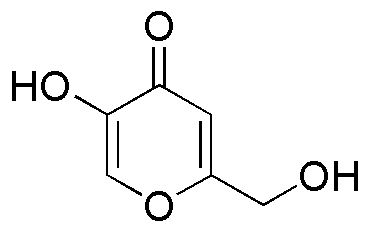Kojic acid is widely utilized in research focused on
- Cosmetics: Kojic acid is a popular ingredient in skin lightening products due to its ability to inhibit melanin production, helping to reduce dark spots and hyperpigmentation.
- Food Preservation: It serves as a natural preservative in food products, effectively preventing the growth of harmful bacteria and fungi, thus extending shelf life.
- Pharmaceuticals: In the pharmaceutical industry, it is used for its antioxidant properties, which can help in formulating products aimed at reducing oxidative stress in cells.
- Biotechnology: Researchers utilize kojic acid in various biochemical assays and experiments, particularly in studies related to enzyme inhibition and metabolic pathways.
- Agriculture: Kojic acid is being explored as a natural fungicide, providing an eco-friendly alternative to synthetic chemicals for protecting crops from fungal infections.
General Information
Properties
Safety and Regulations
Applications
Kojic acid is widely utilized in research focused on
- Cosmetics: Kojic acid is a popular ingredient in skin lightening products due to its ability to inhibit melanin production, helping to reduce dark spots and hyperpigmentation.
- Food Preservation: It serves as a natural preservative in food products, effectively preventing the growth of harmful bacteria and fungi, thus extending shelf life.
- Pharmaceuticals: In the pharmaceutical industry, it is used for its antioxidant properties, which can help in formulating products aimed at reducing oxidative stress in cells.
- Biotechnology: Researchers utilize kojic acid in various biochemical assays and experiments, particularly in studies related to enzyme inhibition and metabolic pathways.
- Agriculture: Kojic acid is being explored as a natural fungicide, providing an eco-friendly alternative to synthetic chemicals for protecting crops from fungal infections.
Documents
Safety Data Sheets (SDS)
The SDS provides comprehensive safety information on handling, storage, and disposal of the product.
Product Specification (PS)
The PS provides a comprehensive breakdown of the product’s properties, including chemical composition, physical state, purity, and storage requirements. It also details acceptable quality ranges and the product's intended applications.
Certificates of Analysis (COA)
Search for Certificates of Analysis (COA) by entering the products Lot Number. Lot and Batch Numbers can be found on a product’s label following the words ‘Lot’ or ‘Batch’.
Numéro de catalogue
Numéro de lot/série
Certificates Of Origin (COO)
This COO confirms the country where the product was manufactured, and also details the materials and components used in it and whether it is derived from natural, synthetic, or other specific sources. This certificate may be required for customs, trade, and regulatory compliance.
Numéro de catalogue
Numéro de lot/série
Safety Data Sheets (SDS)
The SDS provides comprehensive safety information on handling, storage, and disposal of the product.
DownloadProduct Specification (PS)
The PS provides a comprehensive breakdown of the product’s properties, including chemical composition, physical state, purity, and storage requirements. It also details acceptable quality ranges and the product's intended applications.
DownloadCertificates of Analysis (COA)
Search for Certificates of Analysis (COA) by entering the products Lot Number. Lot and Batch Numbers can be found on a product’s label following the words ‘Lot’ or ‘Batch’.
Numéro de catalogue
Numéro de lot/série
Certificates Of Origin (COO)
This COO confirms the country where the product was manufactured, and also details the materials and components used in it and whether it is derived from natural, synthetic, or other specific sources. This certificate may be required for customs, trade, and regulatory compliance.


